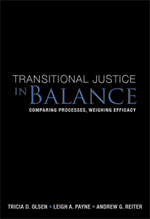Transitional Justice in Balance:
The book “Transitional Justice in Balance: Comparing Processes, Weighing Efficacy,” by Tricia D. Olsen, Leigh A. Payne and Andrew G. Reiter is a groundbreaking effort to strengthen the empirical, theoretical and policy foundations of the field of transitional justice.
 Transitional justice is a topic that has gained an increasing amount of attention in recent years. Countries emerging from the traumas of violent conflict are employing a variety of different transitional justice mechanisms to address human rights violations and promote reconciliation. Despite important steps toward understanding the myriad transitional justice mechanisms available, a dearth of studies analyzing the efficacy of these mechanisms, their contribution to theory building, and their policy implications remains.
Transitional justice is a topic that has gained an increasing amount of attention in recent years. Countries emerging from the traumas of violent conflict are employing a variety of different transitional justice mechanisms to address human rights violations and promote reconciliation. Despite important steps toward understanding the myriad transitional justice mechanisms available, a dearth of studies analyzing the efficacy of these mechanisms, their contribution to theory building, and their policy implications remains.
The book “Transitional Justice in Balance: Comparing Processes, Weighing Efficacy,” by Tricia D. Olsen, Leigh A. Payne and Andrew G. Reiter is a groundbreaking effort to strengthen the empirical, theoretical and policy foundations of the field. The book, which was published by USIP Press in July, systematically analyzes the claims made in the literature using a wide array of data that the authors have assembled into the Transitional Justice Database. Trials, truth commissions, amnesties, reparations, and lustration policies—the main focus of literature to date—are among the 854 transitional justice initiatives, from 161 countries, that are included in the database.
The authors discussed the book’s major conclusions and their implications for the field of transitional justice. USIP Senior Scholar in Residence Neil Kritz also joined the discussion.
Speakers
- Tricia D. Olsen
Ph.D. candidate in Political Science
University of Wisconsin-Madison - Leigh Payne
Professor of Sociology and Latin America
University of Oxford - Andrew G. Reiter
Ph.D. candidate in Political Science
University of Wisconsin-Madison - Neil Kritz
Senior Scholar in Residence, Center for Mediation and Conflict Resolution
United States Institute of Peace - David Backer (Moderator)
Program Officer, Grant Program
United States Institute of Peace



